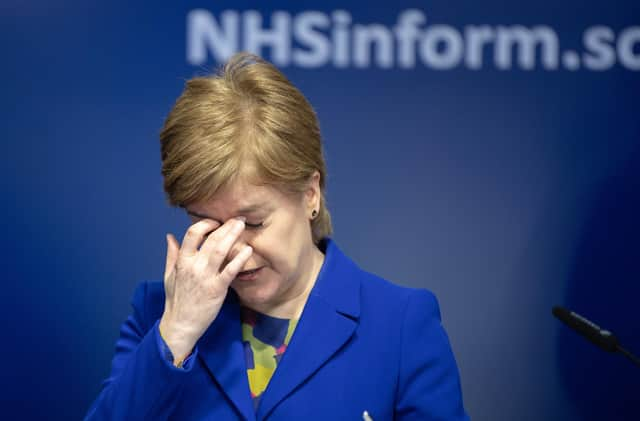Euan McColm: When Nicola Sturgeon appears at the Covid Inquiry, why should we believe a word she says?


Nicola Sturgeon was, inevitably, outraged.
As scandal mounted last weekend over revelations the former First Minister had deleted WhatsApp messages requested by the UK Covid Inquiry, she rumbled on to social media to put a few things straight.
“To be clear,” she wrote, “I conducted the Covid response through formal processes from my office in St Andrews House, not through WhatsApp or any other informal messaging platform.”
Advertisement
Hide AdAdvertisement
Hide AdThe message was clear: There was no scandal because the deleted messages contained no lockdown business.
To be fair to Sturgeon, the line held for four days until her former Chief of Staff, Liz Lloyd, appeared before the inquiry where she was shown and asked about WhatsApp messages in which she and Sturgeon discussed pandemic restrictions.
Sturgeon is due to give evidence to the inquiry on Wednesday. It should make for compelling viewing.
The matter of Sturgeon’s WhatsApp messages continues to be of legitimate concern. Having promised, back in August of 2001, that she would make available all Covid-related communications to the inevitable public inquiry, Sturgeon recently admitted her WhatsApps had been deleted.
The attempt to explain this away – it was done in line with Scottish Government policy, there was nothing relevant among the deleted messages – were far from successful, hence Sturgeon’s online intervention last Saturday.
Giving evidence under oath, Sturgeon will have to do a damned sight better than throwing out lines that can’t survive contact with reality.
The truth is that all “explanations” for Sturgeon’s actions are pure distraction. At the heart of this scandal is a First Minister’s broken promise to a nation with a right to answers about her government’s handling of the coronavirus crisis.
Asked in 2021 whether she’d make her WhatsApp messages available to a future Covid inquiry, Sturgeon did not reply “yes, unless I delete them”, she was unequivocal that she would do so.
Advertisement
Hide AdAdvertisement
Hide AdI wonder whether Sturgeon grasps how serious this matter is. Did she really think last weekend’s intervention – fatally undermined within days – would explain away her betrayal?
A popular story over recent years is that Nicola Sturgeon had a markedly better pandemic than Boris Johnson.
It’s certainly true that Sturgeon proved – unsurprisingly – to be the more reassuring and competent communicator. Johnson spent much of his time fighting off scandal.
But look beyond matters of presentation and we quickly find that outcomes were remarkably similar on either side of the border. Where the UK Government got things right, so did the Scottish. Likewise, mistakes were not generally unique to one or other administration.
I wonder if those Scottish nationalists – and there are many – now rushing to defend Sturgeon would be quite so keen to believe there was nothing to see if we were talking about messages deleted by Johnson, say, or his aide, Dominic Cummings. Of course they wouldn’t. They’d be losing their minds over the absolute squalor of it all.
The UK Covid Inquiry has shone a light on the SNP’s culture of secrecy. We’ve seen evidence of politicians subverting freedom of information legislation and of officials providing misleading information to the press.
People’s experience of the pandemic transcends their position on the constitutional question. Coronavirus did not care whether the lives it was taking belonged to Yes or No voters. There is no reason to believe those who share Sturgeon’s view on independence are in any mood to let her off the hook over her pandemic leadership. We all paid some kind of price during the pandemic and we are all entitled to answers about how those in power responded and about the consequences of their decisions.
Sturgeon, who thoroughly enjoys the indulgence of those who continue to see her as a humble but wise servant of the people, must have winced at the words of Caroleanne Stewart of the group Scottish Covid Bereaved, who last week said of the former First Minister and national clinical director Jason Leitch, who co-hosted many of the daily press conferences throughout the pandemic: “I trusted them, I felt him and Nicola Sturgeon were honest and trying to be open with us and to find out that was all just a facade, I don’t understand how they can hold their head up high.”
Advertisement
Hide AdAdvertisement
Hide AdOnce a bond of trust between voter and politician is broken, it can never be repaired. It’s difficult to see how Sturgeon moves through the inquiry process without suffering further damage to her reputation.
First Minister Humza Yousaf had a deeply uncomfortable appearance before the inquiry on Thursday afternoon. He appeared out of his depth on detail and the tone of his “banter bro” WhatsApps suggested a man of less than serious intention.
Nicola Sturgeon stands to have a tougher time still on Wednesday.
The former First Minister’s line on deletion of WhatsApps is that nothing of relevance has been erased from the record. How can we possibly know that to be true? Within days of Sturgeon’s insistence that no government matters were discussed over WhatsApp, we saw WhatsApps in which Sturgeon and her advisor discussed government matters. I mean, even the most loyal Sturgeon acolyte gets why there are questions, now, right?
The pandemic threw up massive challenges for politicians and, I think, we must be careful we don’t hold them to unreasonable standards. Those in power must be permitted to have made mistakes. But we must feel assured any mistakes that transpired did so in an environment of good faith.
When Nicola Sturgeon appears in front of the Covid Inquiry on Wednesday, she can be expected to insist no evidence of any relevance has been withheld from its scrutiny. Given her broken promise on WhatsApp messages, why should we believe a word she says?
Comments
Want to join the conversation? Please or to comment on this article.